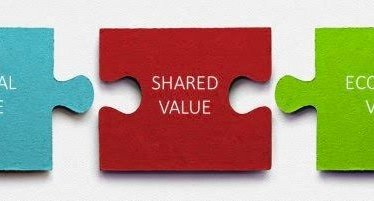Creating Shared Value in Your Community
The people you hire, buy from, and do business with can make your company stronger in surprising ways.
A while back, I had the pleasure of attending a course at the Harvard Business School on Creating Shared Value. It was taught by the very well-respected Faculty Chair of that school, Michael Porter.
There were participants from over 30 countries, and some of the companies represented in the room were British Petroleum, Bill & Melinda Gates Foundation, Amgen, Mitsubishi, Toyota and Nike. The chairman of Nestlé even flew in from Switzerland to participate in one of our case studies.
The experience was transformative for me, and I’m convinced that the future of business lies in shared value. So, what is it? Let me share a passage from the original Harvard Business Review article in which Michael E. Porter and Mark R. Kramer advance the idea:
Companies must take the lead and bring business and society back together. The solution lies in the principle of shared value, which involves creating economic value in a way that also creates value for society by addressing its needs and challenges. . . . Shared value is not social responsibility, philanthropy, or even sustainability, but a new way to achieve economic success.
The authors go on to offer hypothetical examples of how shared value would work in the real world, including one in the fair-trade movement. Fair trade, say the authors, “aims to increase the proportion of revenue that goes to poor farmers by paying them higher prices for the same crops.” The authors contrast this practice with shared value perspective focus
. . . on strengthening the local cluster of supporting suppliers and other institutions in order to increase farmers’ efficiency, yields, product quality, and sustainability. This leads to a bigger pie of revenue and profits that benefits both farmers and the companies that buy from them.
At the individual company level, I understand this to mean that how you operate-who you buy from and sell to, who you hire and promote, and how responsive you are to your particular community’s needs-can create shared value.
Creating shared value in your community doesn’t cut into your profits because you need a strong community around in order to be a strong company. In fact, if you are protecting a premium position, then this approach will help because everybody is making more money.
I’ve been thinking a lot about how our industry can create shared value at the individual retail level as well as broader industry one. It’s a complicated topic and one on which I’ll have more to share with you in the coming months. In the meantime, I hope you’ll explore what the good folks at the Concord Food Co-op are doing in New Hampshire’s capital city. They are very cool operation.
The co-op’s amazing leadership and staff didn’t have to take a course at Harvard to figure out how to run a business that benefits the co-op but also strengthens that “local cluster” of supporting and supported people who comprise their community.
Let me know what you think. And, once again, thank you for all you do to be centers of wellness in your communities.
Sincerely,
Enjoy this article? If you would like to see simple, practical tips in your inbox every week sign up for TwoTip Tuesday to help scale your change-the-world business.
All credit to my ghostwriting partner, Dave Moore, who is instrumental in getting my thoughts out in a coherent manner & into these blogs. Thanks Dave!


